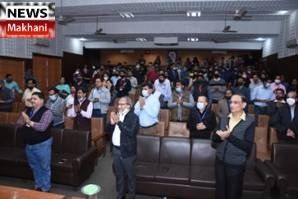Professor K Vijay Raghavan highlights need for increasing opportunity of knowledge generation
Principal Scientific Adviser to the Government of India Professor K Vijay Raghavan underscored that increased opportunity of knowledge generation and decreasing the gap between knowledge and the society as well as increased usage of Artificial Intelligence in analysing the large data, can make India a world leader in Science, Innovation and Technology, at the celebration of the National Science Day by the Wadia Institute of Himalayan Geology (WIHG).
“Human interventions into science and technology have deep-rooted impacts, and the current need is to become more learning-based self-sustained organizational society, as traditionally we use to be,” Shri Professor Vijay Raghavan said while delivering the National Science Day talk online, as the chief guest of the function.
He emphasised the role of geosciences in a technology-driven world, how the rise of the Himalayas has shaped human civilization globally and increasing the role of Wadia Institute of Himalayan Geology in that scenario.
Prof. Kalachand Sain, Director of Wadia Institute, introduced the audience with the speaker’s wide range of expertise and laurels that he brought to nation. A large number of scientists, students gathered physically and also via online platforms to commemorate the event.
At another function at the International Advanced Research Centre for Powder Metallurgy & New Materials (ARCI) on the occasion of National Science Day, scholars from some of the premier institutes all over India delivered talks on topics ranging from 3D printing, alloy design, water purification, artificial intelligence, renewable energy, smart materials etc. at a talk series.
The best three among the young research scholars from IISc, IITs, NITs and Universities who participated in the talk series were evaluated based on a 3-minute. They were selected by a panel of eminent professors and senior scientists based on the novelty, scientific/technical content and relevance to societal needs.
The prize winners were Ms M. Sai Kiran, DST Inspire Fellow (SRF) from Sri Sathya Sai Institute of Higher Learning, Anantapur Campus, Ms Jagriti Singh, Research Scholar, Centre for Nanoscience and Engg., IISc, Bangalore and Ms S. Mamatha, Research Scholar, Centre for Ceramic Processing, ARCI, Hyderabad.
Speaking on the occasion, Dr G. Padmanabham, Director, ARCI, congratulated the young scientists for carrying out materials research in socially relevant areas such as energy, health, environment, advanced manufacturing and so on. He urged the young researchers to elevate their curiosity not only in understanding the scientific phenomena but also the social circumstances in which they live. While mentioning that the best science is happening at the interface of different science streams, he highlighted the importance of interaction among young researchers across disciplines. He underscored emerging materials research trends such as metamaterials, high entropy alloys, application of artificial Intelligence in understanding & designing materials, 3D Printing and so on.
As a part of the ARCI’s outreach activity, Dr Padmanabham released ten ‘Science and Technology Demo Videos for Students’ based on ARCI technology developments. These will be circulated to all schools in the form of a DVD and will also be available on the ARCI website (www.arci.res.in). More such videos will be periodically added on to the ARCI website.
Dr Rakesh K Mishra, Director, CSIR-CCMB Hyderabad, elucidated the challenge, the exciting science, the rigour and the practical aspect of deploying a usable vaccine in the current pandemic situation at the National Science Day talk on ‘The Science, Development and Deployment of Vaccines’.

 हिंदी
हिंदी






